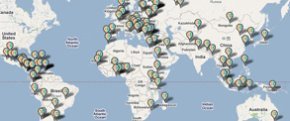Water expo

“There is a water crisis today. But the crisis is not about having too little water to satisfy our needs. It is a crisis of managing water so badly that billions of people – and the environment – suffer badly.” World Water Vision Report
The Challenge
The World Water Council, an international body tasked with promoting awareness and mobilizing global action on critical water issues, notes in its flagship World Water Vision Report that the crisis of water is everyone’s business. This sentiment was echoed at the World Water Expo 2008 in Zaragoza where the World Water Council and other international water bodies gathered for three months last summer to discuss and debate the current issues. At this year’s expo, organizers wanted to include the voices of people who couldn’t physically attend the conference. They approached the World Bank Institute with the question of how to effectively open up the conference to the broader global community?
The Global Development Network (GDLN) responded with a proposal to create a virtual conference that would, for the first time in the history of the expo, make it possible for a wider global audience to join the event.Hosted by the Water Tribune and the World Bank.
Approach
The virtual pavilion at e-waterexpo was a space for debate and innovative knowledge sharing with world-wide participants ranging from water experts to consumers and suppliers. From June 14 to September 14, fifteen sessions were organized in the series. Each week, participants from 5 countries around the world joined in ‘real-time’ the debate taking place at the Water Tribune auditorium, where they could offer suggestions and recommendations to feed into the Expo Zaragoza charter – on issues ranging from financial sustainability, change, reform and capacity development. The GDLN partners around the world facilitated and managed the weekly 3-hour videoconference-based sessions.
In the second session on “Water and Cities”, the focus was on how to feed and provide water to an increasingly urbanized world. ‘Listening to the City, is of crucial importance’, says Mila E. Freire, Senior Advisor Finance Economics and Urban Department to the Vice President of the World Bank, ‘This is essential for successful governance — to accelerate decision-making that enables immediate implementation, while aligning with long term and strategic goals and aspirations’.
Results
More than 5 million people visited the Expo including notable dignitaries such as former Soviet leader, Mikhail Gorbachev and Prince Albert II from Monaco. Of these the e-waterexpo pavilion attracted participants from 20 countries.
On the last day of Expo Zaragoza, the Water Tribune presented its long awaited Zaragoza Charter to HRH King Juan Carlos and Queen of Spain.
‘The Charter will open a door into the future from the present and will contribute to determining the parameters of a new state of the issues regarding water and sustainable development’, said Mestre. ‘The Zaragoza Charter is the backbone of this legacy, it summarises the conclusions reached by over 2000 experts from all fields of knowledge, who gave more than 200 lectures and from the participants from 75 countries, linking Zaragoza to the world in 15 GDLN based sessions.’
Next Steps
This is just one example of the potential of GDLN to provide global solutions to clients around the world. Stay tuned for more innovative programs in the world of water.
For a video of this event go to, Values for a Life Sustaining Civilization (Part 1)
For more information on this program download our flyer here (pdf) or contact Nicolas Meyer at nmeyer@worldbank.org.
